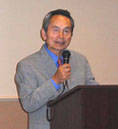Considering Japan's National Fundamentals: A Seminar in the U.S.
Takahiro MIYAO (Professor and Head, Japanese Institute of Global Communications, IUJ)
| Special Seminar in Los Angeles
|
| Date/Time: | July 5 (Saturday) 19:00-21:45 |
| Place: | New Gardena Hotel, Gardena, California, USA |
| Program: |
Main Theme: Supporting Japan' s Efforts to Consider Its National Fundamentals
19:00-19:30
Introduction & Video Presentation
Coordinator Sadao Imamori (Modern & Contemporary History Study Group)
19:30-21:30
Speeches
Professor Koichi Mera (University of Southern California) and other Japanese residents in Los Angeles
Concluding Remarks
Coordinator Sadao Imamori
|
| Organizers: | Modern & Contemporary History Study Group, Los Angeles |
On July 5, there was a special seminar held at a hotel in the Los Angeles area to consider Japan's "national fundamentals," that is, fundamental issues such as Japan's national origin, ideal, identity, history, etc. The seminar was organized by members of Modern & Contemporary History Study Group in support of a think tank, JINF (Japan Institute for National Fundamentals), headed by well-known journalist Yoshiko Sakurai.
After a brief introduction by the organizer, Sadao Imamori, and a video presentation of various activities to initiate JINF in Japan, a number of speakers took turns to express their thoughts on Japan's fundamental issues from their viewpoints. One of the most impressive talks was given by a UCLA student, who had an unforgettable experience when she was confronted by an American teacher in his class with a strong accusation of Japan's "unfairness" in the attack on Pearl Harbor, but was not able to respond to him at all, when she was a community college student. Since then she has been studying modern and contemporary history about Japan and the U.S. all by herself in order to learn about the truth and background of the war between the two nations. As a result, she has realized that Japan was not entirely at fault in various incidents, including the Pearl Harbor attack, leading to the Pacific war.
 Similar points were made by USC Professor Koichi Mera, who emphasized that those stories told by foreign governments and scholars about the wrongdoings and brutalities of Japanese people or military during the war should be carefully interpreted, as most of the accusations in those stories are dubious to say the least and often deliberately falsified. We need to study modern history about western powers' presence and Japan's response in the Asia-Pacific region without distortions, which are almost inevitable if we take the viewpoint of foreign countries, according to Prof. Mera. It is interesting to note that an internationally minded person like him with his academic and professional career mostly in the U.S., as well as international organizations has come to a conclusion that Japanese people must establish their identity as Japanese by studying their own history from their own viewpoint, instead of the "anti-Japanese" viewpoint. Similar points were made by USC Professor Koichi Mera, who emphasized that those stories told by foreign governments and scholars about the wrongdoings and brutalities of Japanese people or military during the war should be carefully interpreted, as most of the accusations in those stories are dubious to say the least and often deliberately falsified. We need to study modern history about western powers' presence and Japan's response in the Asia-Pacific region without distortions, which are almost inevitable if we take the viewpoint of foreign countries, according to Prof. Mera. It is interesting to note that an internationally minded person like him with his academic and professional career mostly in the U.S., as well as international organizations has come to a conclusion that Japanese people must establish their identity as Japanese by studying their own history from their own viewpoint, instead of the "anti-Japanese" viewpoint.
Other speakers also shared their views and experiences with the audience and expressed their support for JINF and its president Yoshiko Sakurai, who has been trying hard to regain self-esteem and self-confidence on the part of the Japanese public, often "falsely" accused by neighboring countries on some historical matters. In conclusion, Mr. Imamori pointed out that the seminar was a first step for Japanese nationals living in the Los Angeles area to take Japan's fundamental issues seriously and work together to see Japan reborn as an independent nation.
This report is adopted from the following blog (with its Japanese translation):
http://glocom.blog59.fc2.com/blog-entry-746.html
|





